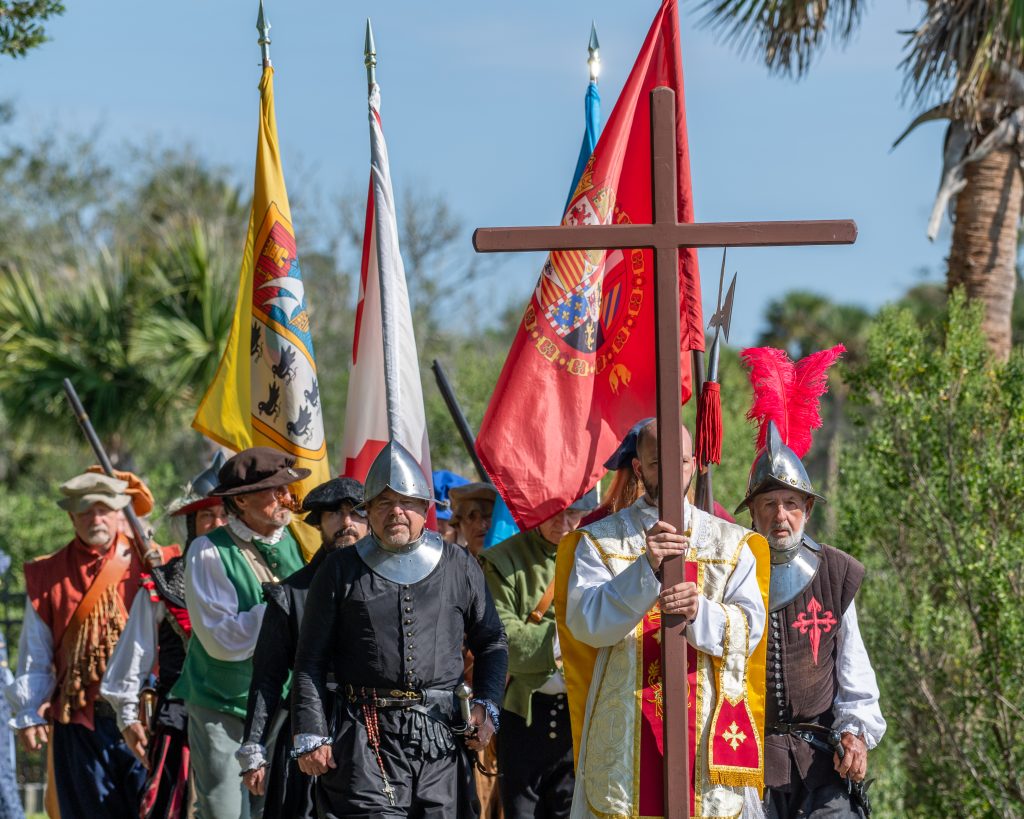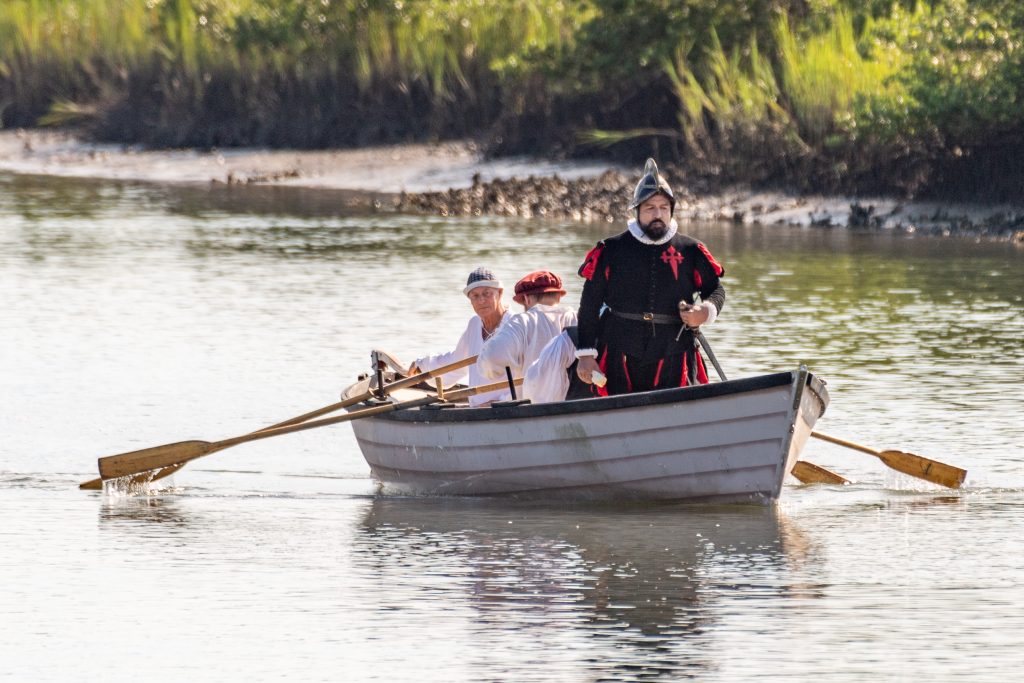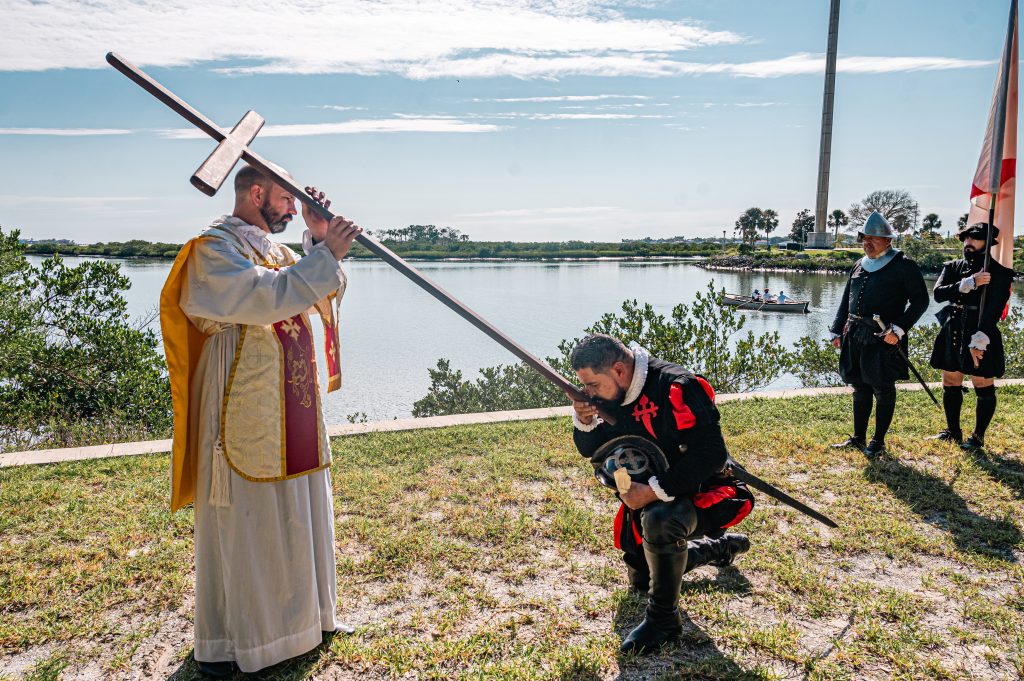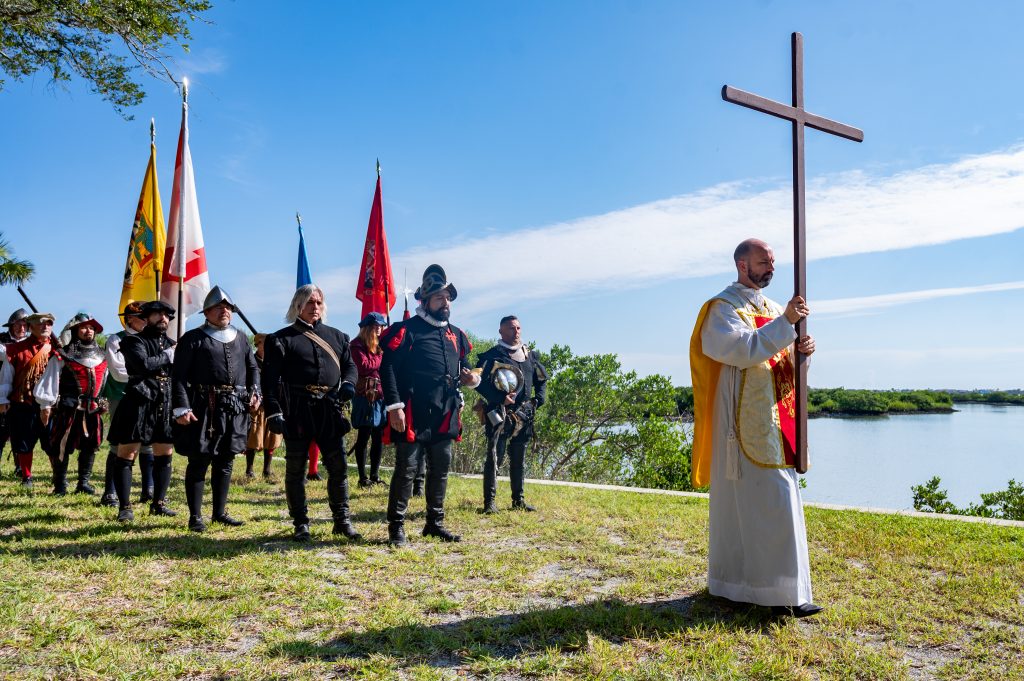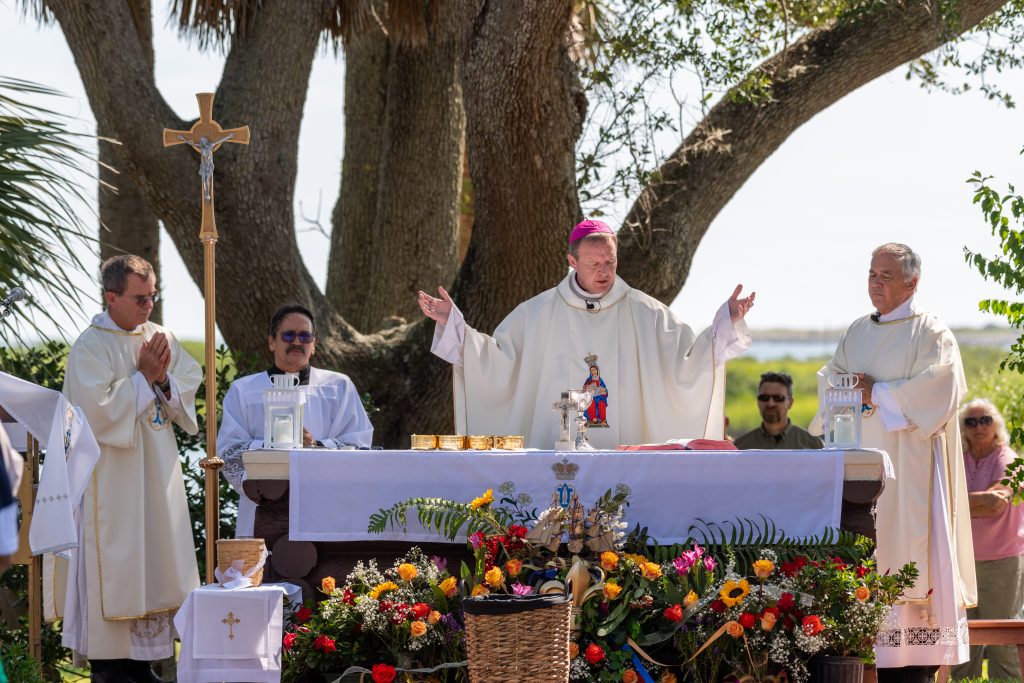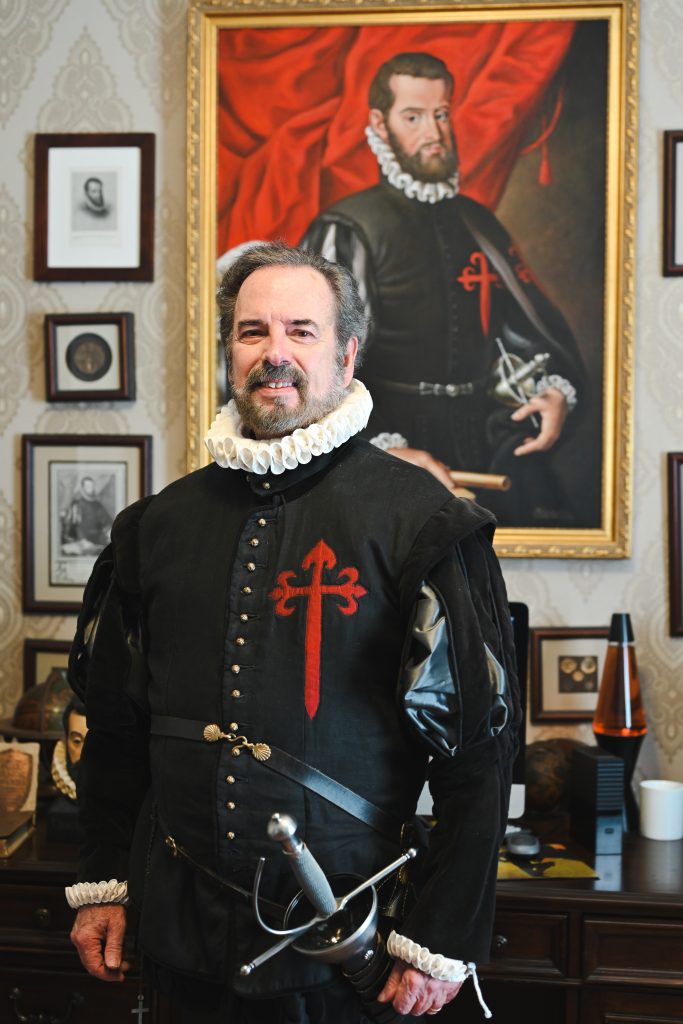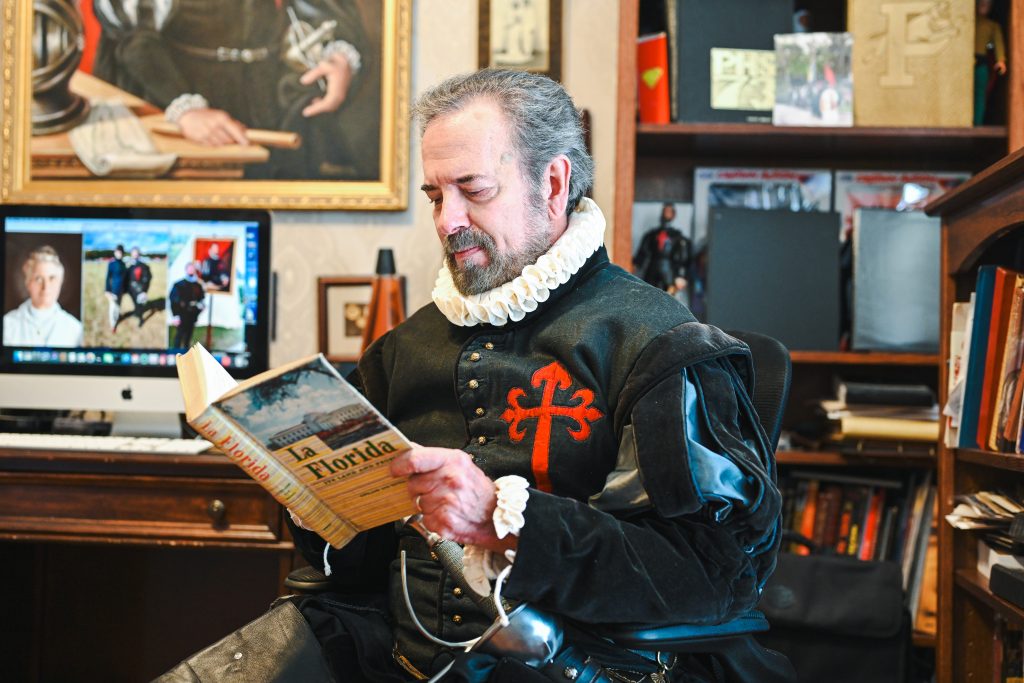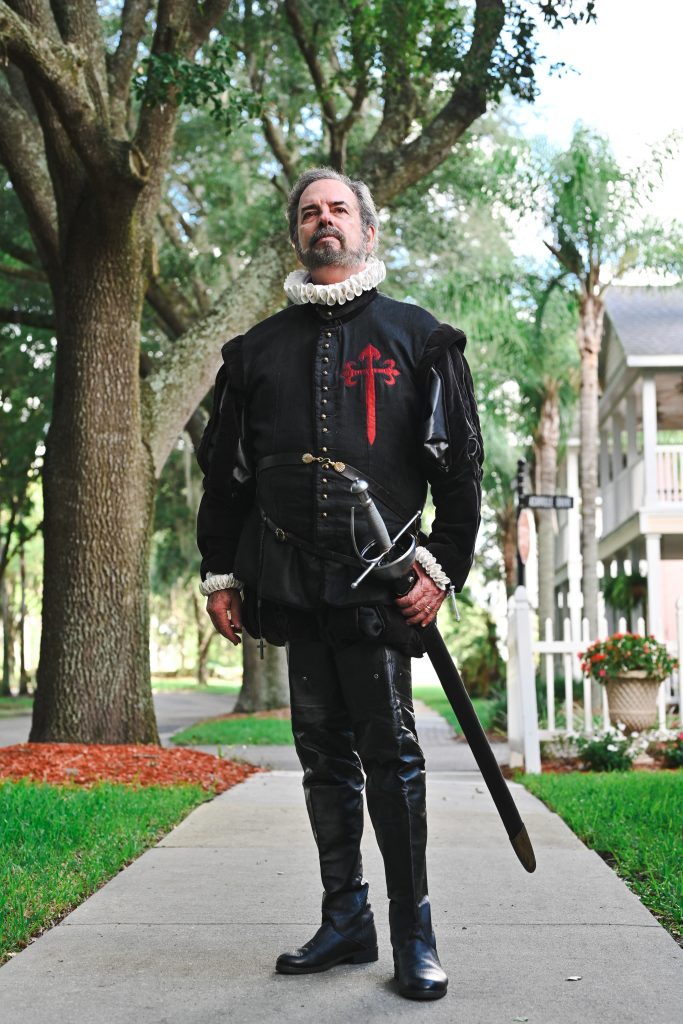By Lilla Ross
The Sept. 8, 1565, anniversary of St. Augustine’s founding is special for Mark Menéndez and his family because Mark is a descendant of Pedro Menéndez, who established the garrison city of St. Augustine in the Spanish colony of La Florida. Pedro Menéndez also brought priests to serve the spiritual needs of soldiers and settlers and introduced Christianity to Native Americans.
Mark discovered his connection to Pedro Menéndez in fourth grade while learning about Spanish explorers. That night, he told his father that one of the explorers was named Menéndez. His father then revealed the family’s relation to Pedro Menéndez, sparking a lifelong passion for Mark.
At 18, Mark painted a portrait of Pedro Menéndez based on an etching by 18th-century artist Francisco de Paula Martí. In 2000, Mark and his father presented the portrait to the Diocese of St. Augustine, where it now hangs over the Menéndez casket in the Mission Nombre de Dios Museum.
After his father died in 2005, Mark sought to confirm the family’s oral tradition by hiring a Spanish genealogist to trace their history. Using records from the Cathedral Basilica of San Salvador in Oviedo, the genealogist traced Mark’s heritage to Pedro Menéndez’s mother, María Alonso y Menéndez Arango, and her brothers, who took the surname of Ynclan. The genealogist, coincidentally also related to Menéndez, holds the title of adelantado, the same title King Philip gave to Pedro Menéndez.
In 2017, during the commemoration of Menéndez’s second colony, Santa Elena, in Beaufort, S.C., Mark met Count Álvaro Armada Barcaiztegui, Conde de Reivilla-Gigedo, a descendant of Pedro Menéndez’s older brother, Don Álvaro Menéndez de Avilés. The count, who also holds the title of adelantado, exclaimed upon hearing Mark’s surname “Ynclan,” “Then, we are related!” and referred to Mark as his “cousin.”
This year’s celebration holds special significance for St. Augustine as it marks the 100th anniversary of the city’s relationship with Menéndez’s ancestral home of Avilés, Spain. “Our Spanish colonial roots are what makes us a unique city,” said Mayor Nancy Sikes-Kline. “We want to use this occasion to deepen our ties and broaden our relationship for the next 100 years.”
St. Augustine and Avilés first established a relationship in 1924 when a delegation appointed by the governor sailed to Spain to attend Menéndez’s reburial at the Church of San Antonio de Padua. During their stay, the delegation lunched with King Alfonso XIII and was given Menéndez’s outer coffin, now exhibited at the Mission Nombre de Dios Museum. The relationship was interrupted by world wars and was formalized as a Sister City in 1967. Over the years, the cities have exchanged gifts, including a replica sword, medallions, and a statue in front of City Hall.
In 2000, the cities reaffirmed their bond and expanded the relationship to include cultural and educational exchanges, bringing students, artists, musicians and others to St. Augustine.
As part of this year’s celebration, a St. Augustine delegation, including the mayor and Father John Tetlow, rector of the Cathedral Basilica, will visit Spain in August. Activities will include a re-enactment and procession, a wreath-laying in front of the Menéndez statue and a visit to the Church of San Antonio de Padua, where Menéndez is buried.
A delegation from Avilés will visit St. Augustine in September to witness the annual re-enactment and procession of Founder’s Day, a wreath-laying, the unveiling of an interpretive marker, the rededication of a mosaic from Avilés and concerts by Tejedor, a folk music band from Avilés.
“This is an opportunity to share our experiences and celebrate our municipal relationship,” Sikes-Kline said. “We hope this leads to an expansion of our exchanges in trade and investment, academic and cultural exchanges, high technology and science, historic preservation, environmental protection, artistic exchange, sports and tourism promotion, and municipal economic development.”
The Early Beginnings of Catholicism in Florida
On September 8, 1565, a small band of Spaniards celebrated a Mass of Thanksgiving on the shores of Northeast Florida, marking the beginning of a new settlement. They named it St. Augustine in honor of the saint on whose feast day they sighted land (August 28). This momentous event planted the seeds of Christianity in America north of Mexico.
St. Augustine boasts the first permanent parish church, now the Cathedral Basilica. It is also the starting point of the famed Santa Fe Trail. From this historic city, Franciscan missionaries embarked on journeys north and west to spread the Good News. St. Augustine also saw the establishment of the first schools and hospitals, laying the foundation for a rich legacy of faith and social support.
Founder’s Day Activities
Thursday, Sept. 5
8 p.m. Free public Tejedor Concert, Lewis Auditorium
14 Granada St. 32084 | (904) 826-8600
Friday, Sept. 6
10 a.m. Welcome and wreath-laying ceremony at City Hall
75 King St. 32084 | (904) 825-1007
Saturday, Sept. 7
10 a.m. – Founder’s Day Historical Re-enactment
11 a.m. – Mass celebrated by Bishop Erik Pohlmeier, Outdoor Rustic Altar
Noon – Pedro Menéndez with his entourage marches to the Fountain of Youth
National Shrine of Our Lady of La Leche at Mission Nombre de Dios
101 San Marco Ave. 32084 | (904) 824-2809
1:00 p.m. – Ceremonial First Thanksgiving Meal Reenactment
1:00 to 5:00 p.m. – Encampment and living history demonstrations
The Fountain of Youth Archaeological Park
11 Magnolia Ave. 32084 | (904) 829-3165
Free public Tejedor Evening Concert, Colonial Oak Music Park
33 St. George St. 32084 | (904) 342-2857
Sunday, Sept. 8
10 a.m. Unveiling of interpretive marker and tile mosaic, Avilés Street
2 p.m. Free public Tejedor Concert, Plaza de la Constitución
1 Cathedral Place | (904) 825-1007
Monday, Sept. 9
5 p.m. Proclamation presentation by the Mayor at the City Commission meeting
75 King St., (Alcazar Room) 32084 | (904) 825-1006

